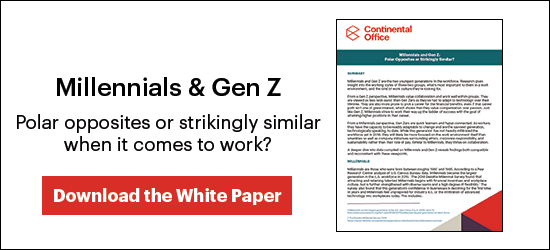Millennials and Gen Z are the two youngest generations in the workforce. With the oldest Gen Zers beginning to join Millennials in the workplace, it’s important to acknowledge the working styles of each group, what’s important to them in a working environment, and what kind of work culture will get them to stay.
Millennials are those who were born between 1980 and 1995. According to a Pew Research Center analysis of U.S. Census Bureau data, Millennials became the largest generation in the U.S. workforce in 2016. Not only are they the most educated generation in history, but Millennials are the first generation to have been immersed in technology throughout their lives. Millennials are known to value collaboration and work well within groups. The 2018 Deloitte Millennial Survey found that employers can attract and retain Millennials through financial incentives, workplace culture, diverse teams, and flexibility. Due to their experience with greater unemployment during the Great Recession, they are often accused of being disloyal and may change jobs up to 20 times in their career.
Gen Z, also known as the iGen, includes those who were born between 1995 and 2010. The oldest Gen Zers are aged around 22, and they’re expected to comprise 20% of the workforce in just three years. Gen Zers were born with technology at their fingertips. Because technology is such an all-encompassing part of each Gen Zers’ life, they appreciate in-person communication. In addition, Gen Zers are said to be more competitive in the workplace and recognize the importance of diversity in everyday life. When looking for a job, Gen Z desires a flexible working environment to blend work and life together, along with an empowering work culture.
Aside from the differences between Millennials and Gen Z, these two groups both:
- Look for companies that provide growth and offer leadership positions
- Have a strong desire for mentorship
- Choose purpose-driven careers
Click below to download our white paper and find out if Millennials and Gen Z are ultimately more compatible or inconsistent in the workforce.





Comments